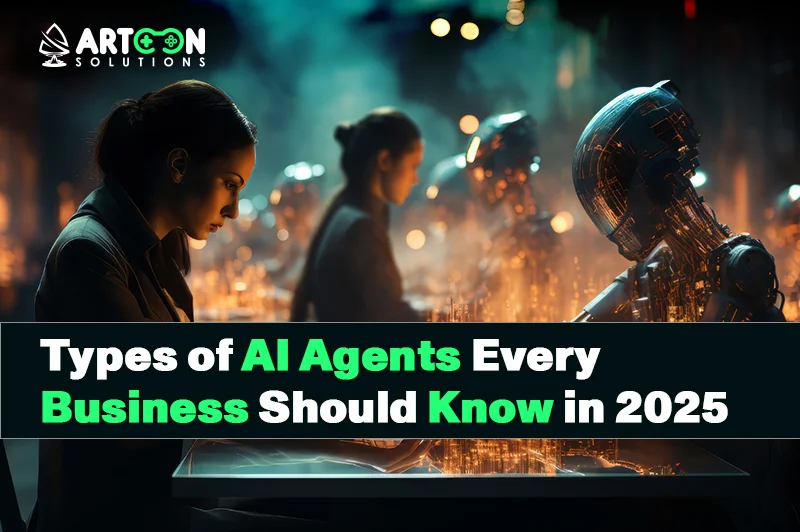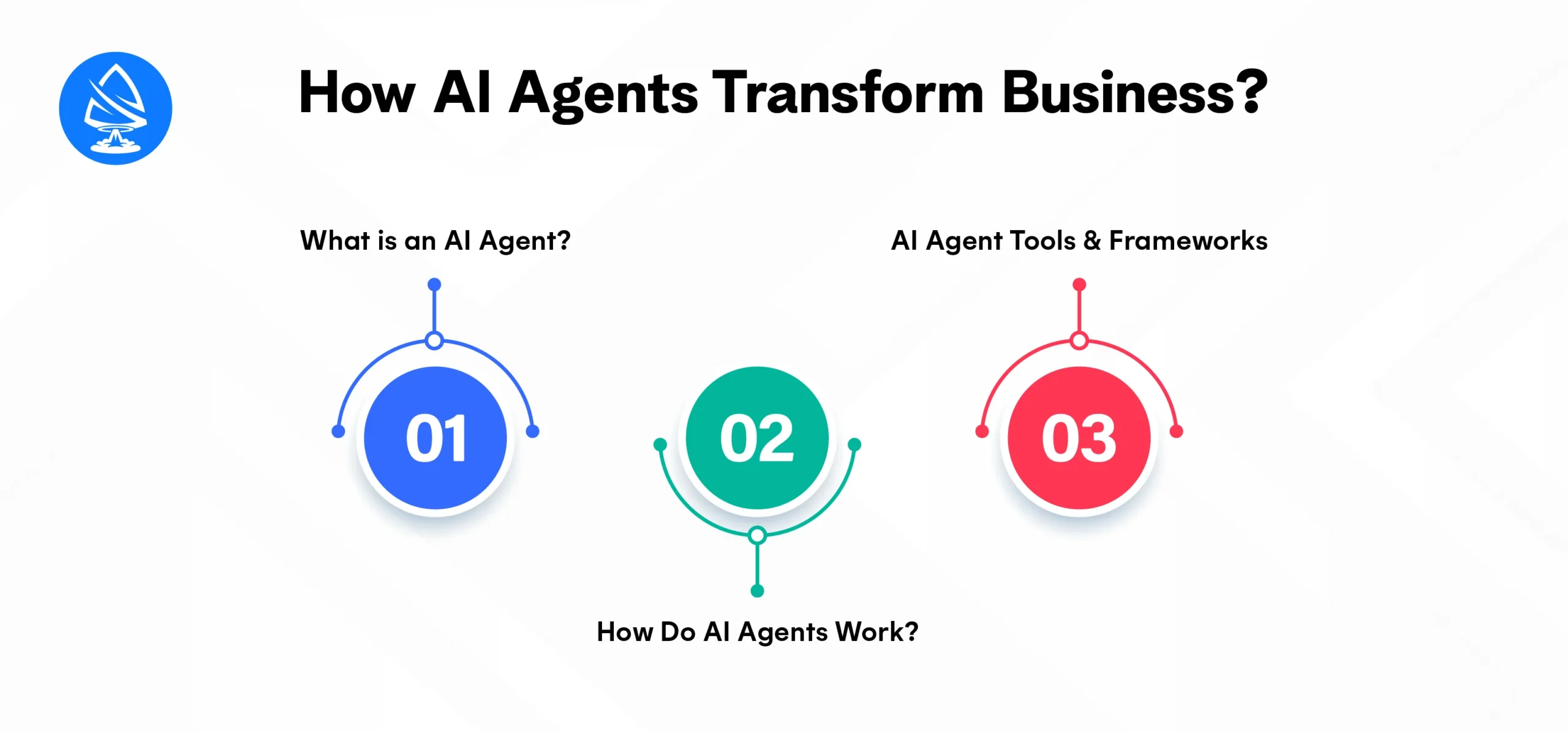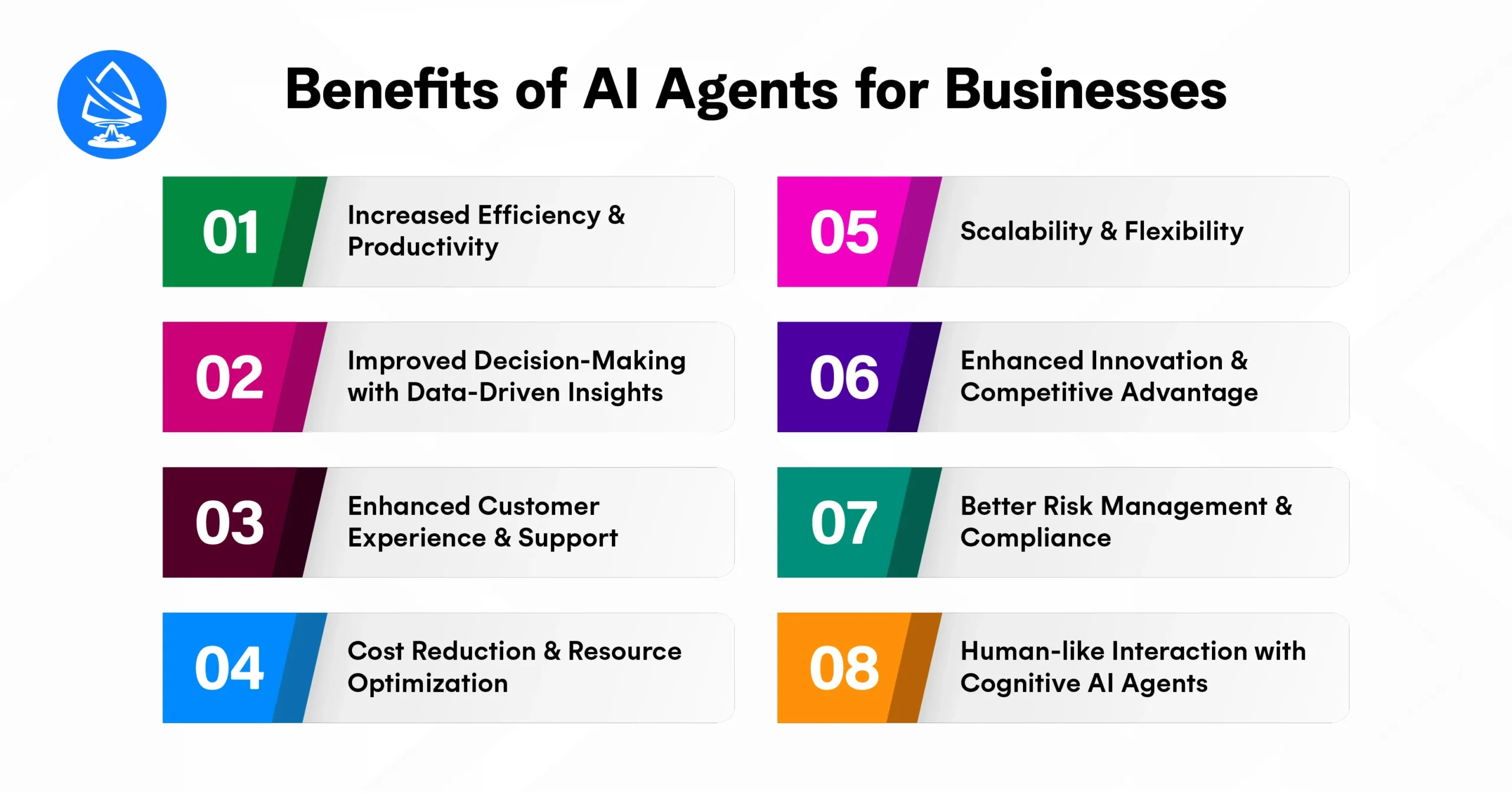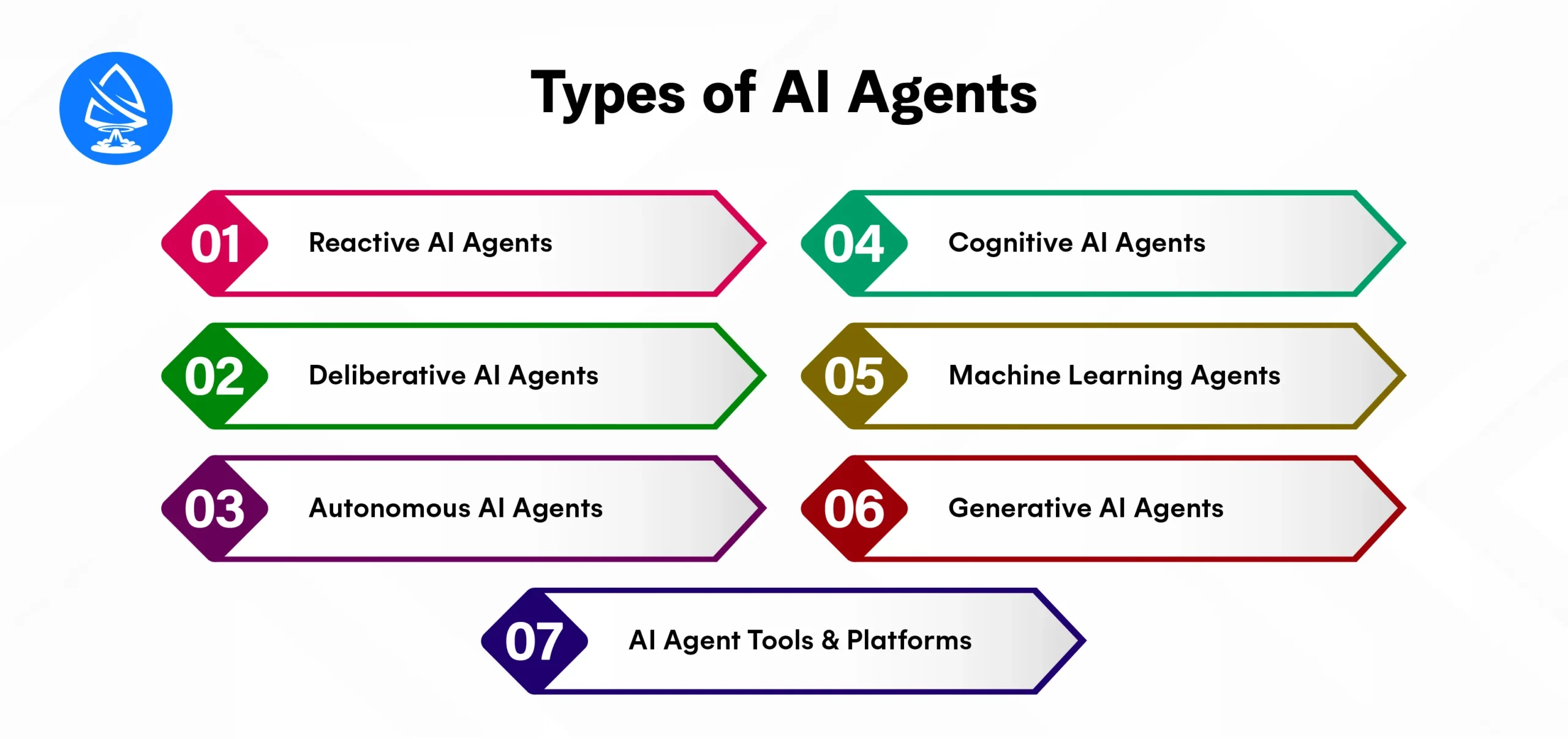- HR:+91-879-9184-787
- Sales:+91-908-163-7774

Artificial Intelligence (AI) has rapidly evolved, and it’s transforming the way businesses operate. As we head into 2025, AI agents are becoming an integral part of modern business operations. AI agents are systems designed to autonomously perform tasks, make decisions, and interact with their environment to achieve specific goals. With numerous types of AI agents emerging, understanding these agents is essential for businesses looking to leverage AI for automation, optimization, and innovation.
In this blog post, we will explore the types of AI agents every business should know about, including their features, use cases, and benefits. Whether you’re building AI-powered systems, enhancing customer experience, or automating workflows, these AI agents can help you stay ahead in the competitive landscape of 2025. To implement these AI agents effectively, consider hire AI developers who can create customized solutions tailored to your business needs.
AI agents are a core component of artificial intelligence technology, and they are reshaping industries by making decisions, automating tasks, and improving efficiency. AI agents can interact with their environment, learn from experience, and perform specific tasks or goals autonomously, making them one of the most valuable innovations in AI. Understanding what AI agents are, how they work, and their potential applications is essential for businesses that want to harness the power of AI for greater productivity, innovation, and competitive advantage.
In this article, we will dive deep into the concept of AI agents, their types, how they function, and how they can be applied across different industries to drive transformative results.

An AI agent is a system that is designed to autonomously perform tasks, make decisions, and interact with its environment. These agents use algorithms, sensors, and data to interpret their surroundings and take actions that help them achieve specific goals. AI agents can adapt to new situations and learn from past experiences through machine learning, enabling them to improve their performance over time.
The main characteristics of AI agents include:
AI agents work by interacting with their environment and using data to make decisions. Here’s how the process generally works:
Example: In a customer service scenario, a chatbot AI agent perceives a user’s query, processes it to understand intent, provides an appropriate response, and learns from the conversation to improve future interactions.
Creating and deploying AI agents requires the right tools and frameworks. Here are some popular AI agent tools and frameworks that developers use to build intelligent agents:
Artificial Intelligence (AI) is increasingly becoming a fundamental part of the modern business ecosystem. AI agents, autonomous or semi-autonomous systems designed to perform tasks and make decisions, are revolutionizing how companies operate, communicate, and innovate. These AI-driven agents can automate processes, optimize operations, improve customer experiences, and generate valuable insights.
In this article, we will explore the key benefits of AI agents for businesses and how these intelligent systems are helping companies thrive in an increasingly competitive and fast-paced world.

One of the most significant benefits of AI agents is the ability to automate repetitive tasks. AI agents are highly efficient in performing routine operations, freeing up valuable time for employees to focus on more strategic tasks.
Example: An AI-powered sales assistant can automate lead generation, follow-up emails, and schedule meetings, significantly improving productivity and saving time for sales teams.
AI agents excel at processing vast amounts of data and extracting meaningful insights that humans might miss. By leveraging machine learning and deep learning algorithms, AI agents can help businesses make smarter, data-driven decisions.
Example: Retail businesses use AI agents to analyze consumer behavior, predict demand, and optimize inventory levels, helping them avoid stockouts or overstocking issues.
AI agents, particularly chatbots and virtual assistants, are reshaping the way businesses interact with customers. These AI systems can handle a variety of customer service tasks, providing faster and more personalized support.
Example: A banking chatbot can help customers check their account balances, transfer funds, and answer banking-related questions instantly, offering a more convenient and streamlined customer service experience.
AI agents help businesses save costs by improving efficiency, automating routine tasks, and reducing human errors. Here’s how AI agents can help optimize resources and cut costs:
Example: AI-powered manufacturing robots can automate tasks like assembly, testing, and quality control, reducing labor costs and minimizing product defects.
As businesses grow, the need to scale operations efficiently becomes crucial. AI agents offer businesses the ability to scale without significantly increasing overhead costs.
Example: A cloud-based AI support system can handle a surge in customer queries during peak shopping seasons without the need for additional human agents.
AI agents empower businesses to stay ahead of the competition by facilitating innovation and offering new opportunities for product development, services, and solutions. With AI agents, businesses can:
Example: A tech company using AI-powered software can quickly analyze emerging market trends, customer feedback, and competitors’ products to design innovative new features that differentiate them from competitors.
AI agents can assist businesses in managing risks by identifying potential threats and ensuring compliance with industry regulations. They help businesses mitigate financial, security, and operational risks by:
Example: AI-powered fraud detection systems in the finance industry can monitor transactions in real time, identifying and flagging suspicious activity, thus reducing the risk of fraud.
Cognitive AI agents are designed to simulate human thinking, including reasoning, perception, and problem-solving. These advanced agents offer human-like interactions, making them ideal for businesses that rely on communication with customers.
Example: AI virtual assistants like Google Assistant and Apple’s Siri use natural language processing to help customers find information, set reminders, or answer queries, creating more engaging and human-like interactions.

Reactive AI agents are the most basic type of AI agent. These agents act based on predefined rules or direct stimuli from their environment. They do not possess a memory of past actions and react solely to the current situation.
Example: A customer service chatbot that can respond to basic queries like “What are your business hours?” or “Where is my order?” is a typical reactive AI agent.
What Are Deliberative AI Agents?
Deliberative AI agents are more advanced than reactive agents because they plan and reason before taking action. These agents evaluate the environment, simulate potential actions, and choose the most optimal solution based on their reasoning process.
Benefits and Use Cases:
Example: An AI system used in inventory management that not only predicts demand but also plans the restocking schedule based on current inventory levels, supplier delays, and sales forecasts is an example of a deliberative AI agent.
Autonomous AI agents are self-sufficient and capable of performing tasks without human intervention. They possess the ability to make decisions and take actions in a dynamic and unpredictable environment. These agents combine machine learning, planning, and decision-making algorithms to operate independently.
Example: Self-driving cars are a prime example of autonomous AI agents. These cars use sensors, machine learning, and decision-making algorithms to drive safely without human input.
Cognitive AI agents are designed to mimic human thought processes, including reasoning, perception, and learning. They go beyond simple task automation and attempt to simulate human cognitive functions such as problem-solving, language understanding, and decision-making.
Example: AI-powered virtual assistants, like Amazon Alexa or Google Assistant, are cognitive agents that understand and respond to spoken commands, learning from user interactions to improve performance.
Machine learning agents are types of AI agents that use machine learning algorithms to learn from data and improve their performance over time. Unlike reactive agents, machine learning agents can adapt to new situations based on data they’ve processed in the past.
Example: AI-powered recommendation systems, like the ones used by Netflix or Spotify, are machine learning agents that learn from user interactions and recommend content based on their preferences.
Generative AI agents are a subcategory of AI that focuses on creating new data or content, such as text, images, music, or videos. These agents use generative models like Generative Adversarial Networks (GANs) to produce new outputs that resemble real-world data.
Example: DeepArt uses generative AI to create artwork based on the style of famous painters, while tools like GPT-3 generate human-like text for content creation.
AI agent tools refer to the software, frameworks, and platforms used to build, deploy, and manage AI agents. These tools enable developers to create agents that can perform a wide range of tasks, from automating workflows to engaging with customers in natural language.
Example: Rasa, an open-source conversational AI platform, provides developers with the tools to build custom chatbots and virtual assistants that can be integrated into customer support systems.
As AI continues to evolve, the role of AI agents in business is becoming more pivotal. From reactive agents that handle simple tasks to generative agents that create new content, the different types of AI agents offer a wide range of capabilities that can optimize operations, improve customer experiences, and drive innovation.
By understanding the types of AI agents, businesses can harness the power of AI to automate processes, analyze data, and stay ahead of the competition. Whether you’re looking to enhance customer service, improve decision-making, or innovate your product offerings, Types of AI Agents provide the tools and functionality to help you succeed. Partnering with an artificial intelligence development company in USA can help you implement these agents effectively and tailor them to your specific business needs.
An AI agent is a system that uses AI algorithms to make decisions, take actions, and interact with its environment to achieve specific goals.
The main types of AI agents include reactive agents, deliberative agents, autonomous agents, cognitive agents, machine learning agents, and generative AI agents.
Autonomous AI agents are self-sufficient and can make decisions and take actions without human intervention, using machine learning and data analysis to adapt to their environment.
Yes, AI agents like chatbots and virtual assistants are commonly used to handle customer inquiries, provide support, and resolve issues in real time.
Generative AI agents can create new content, such as images, text, or designs, which can be used in marketing, entertainment, and other creative industries.
AI agents automate repetitive tasks, improve decision-making, and optimize workflows, leading to cost savings and increased efficiency.
While AI agents provide numerous benefits, businesses must also consider security risks related to data privacy, algorithm bias, and potential misuse.